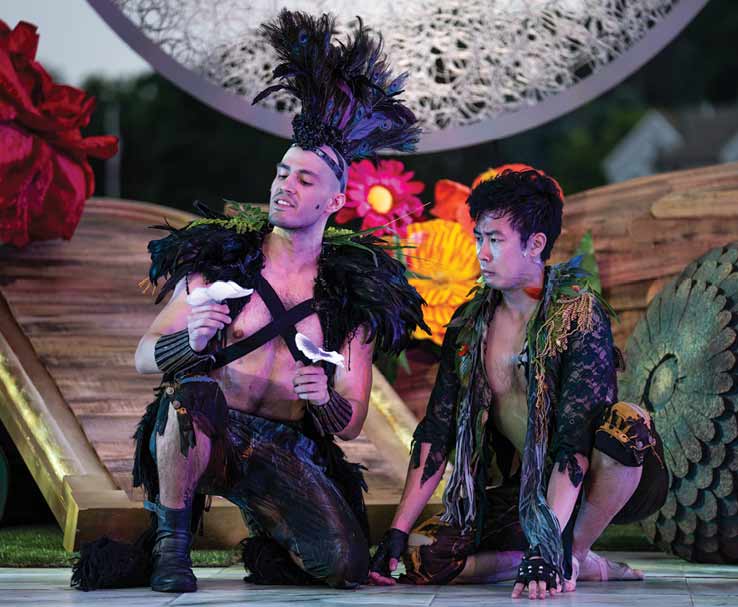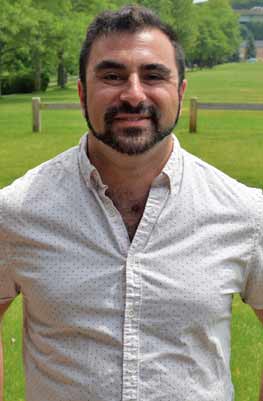Nonprofit theater companies bring summertime Shakespeare to regional audiences
This summer, two local nonprofit theater companies will be offering new productions of Shakespearean plays for Fairfield County audiences.

From July 11-14, Shelton”™s Veterans Memorial Park will host the Valley Shakespeare Festival”™s production of “Henry VIII.” This is something of an unusual choice, acknowledged Tom Simonetti, the festival”™s creator and executive director. “Henry VIII” is rarely revived and many Shakespeare scholars place it among his least successful works. But Simonetti is up for the challenge.
“It”™s our first time doing a history play,” said Simonetti, who launched the Shelton-based Equity theater company in 2013. “But I decided to go for a history, and out of all of the histories I was going to pick for this town, ”˜Henry VIII”™ is going to get people downtown. Because if you ask people here, ”˜Hey do you know Henry V?”™ you get ”˜Who?”™ Or, ”˜Do you know Richard III?”™ They”™ll say ”˜There are three of them?”™ But if you say ”˜Henry VIII,”™ well, everyone knows the wives.”
“Henry VIII” is the third of Valley Shakespeare Festival”™s annual offering of three Shakespearean works. The organization presents an early spring “touring” show that plays in different venues across Shelton. “The Merchant of Venice” was this year”™s entry, followed by an annual “Shakespeare in the Bar” that plants the Bard”™s work in a tavern setting. A unique version of “Two Gentlemen of Verona” starring a pair of actors each taking on nine different roles was staged earlier this month.
“We don”™t have our own theater, so our shows can go wherever we need to,” Simonetti said.

Valley Shakespeare Festival also stages truncated versions of its productions for schools, offering a one-hour workshop to explain the plots of the plays and the nuances of the Shakespearean language. Simonetti always enjoys the wonder of the youthful audience.
“They love it,” he exclaimed. “They do understand it. One of my favorite things I”™ve heard in schools was, ”˜Wait, when was this play written?”™ And I would say 1599 or 1600, depending on what we were doing and I”™d follow up with, ”˜Does it sound like it?”™ And they would say, ”˜No! It sounds like it was written today.”™ ”
Simonetti finds himself frequently streamlining the plays to meet the needs of their settings and contemporary considerations. This year”™s version of “The Merchant of Venice” included a pre-show talk that placed the show in a historical perspective and addressed how Shakespeare viewed the anti-Semitic actions that shaped Shylock”™s character.
“A lot of work went into making sure we didn”™t whitewash anything too much because you need to see the hurt and the pain,” Simonetti added.
Shakespeare on the Sound is launching its 24th season with a new version of “Twelfth Night” that will be staged from June 20 to July 7 (except on Mondays) at Pinkney Park in Rowayton.
“We get around 11,000 for our 16 performances,” said Claire Kelly, artistic director for the Norwalk-headquartered nonprofit. “It is very dependent on the weather and the play that is selected.”
Shakespeare on the Sound only stages one play per year. “We mainly do the comedies, tragedies and romance plays,” Kelly continued. “The history plays are a little more difficult and require very large casts. And they are also not as popular as the other shows.”
In addition to the full-length production, Shakespeare on the Sound also stages a half-hour truncated version ahead of the main presentation for what Kelly describes as “kids of all ages.” The nonprofit is also a longtime presence in the region”™s elementary, middle and high schools with the 30-minute versions of the show, and has recently ventured into a new effort specifically for this non-theatrical setting.
“This year, we launched a two-person ”˜Romeo and Juliet”™ focusing on their story,” Kelly stated. “We did a tour for two weeks and I”™m pleased to say it was a huge success.”
This new “Romeo and Juliet” was also an interactive effort, with students recruited to play the supporting characters and ad-lib their reactions to the lovers”™ quandary. “The scenes were performed around them,” Kelly noted. “They were active participants in the creation, rather than watching it passively.”